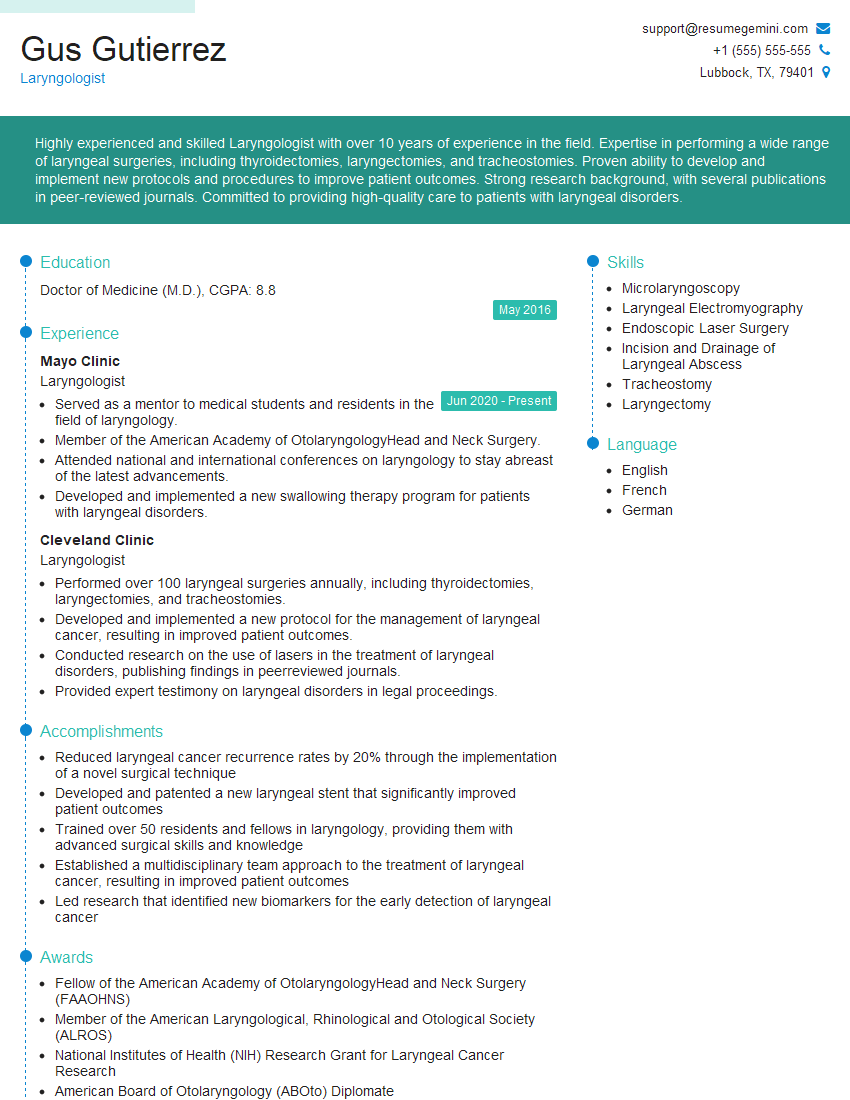Are you a seasoned Laryngologist seeking a new career path? Discover our professionally built Laryngologist Resume Template. This time-saving tool provides a solid foundation for your job search. Simply click “Edit Resume” to customize it with your unique experiences and achievements. Customize fonts and colors to match your personal style and increase your chances of landing your dream job. Explore more Resume Templates for additional options.

Gus Gutierrez
Laryngologist
Summary
Highly experienced and skilled Laryngologist with over 10 years of experience in the field. Expertise in performing a wide range of laryngeal surgeries, including thyroidectomies, laryngectomies, and tracheostomies. Proven ability to develop and implement new protocols and procedures to improve patient outcomes. Strong research background, with several publications in peer-reviewed journals. Committed to providing high-quality care to patients with laryngeal disorders.
Education
Doctor of Medicine (M.D.)
May 2016
Skills
- Microlaryngoscopy
- Laryngeal Electromyography
- Endoscopic Laser Surgery
- Incision and Drainage of Laryngeal Abscess
- Tracheostomy
- Laryngectomy
Work Experience
Laryngologist
- Served as a mentor to medical students and residents in the field of laryngology.
- Member of the American Academy of OtolaryngologyHead and Neck Surgery.
- Attended national and international conferences on laryngology to stay abreast of the latest advancements.
- Developed and implemented a new swallowing therapy program for patients with laryngeal disorders.
Laryngologist
- Performed over 100 laryngeal surgeries annually, including thyroidectomies, laryngectomies, and tracheostomies.
- Developed and implemented a new protocol for the management of laryngeal cancer, resulting in improved patient outcomes.
- Conducted research on the use of lasers in the treatment of laryngeal disorders, publishing findings in peerreviewed journals.
- Provided expert testimony on laryngeal disorders in legal proceedings.
Accomplishments
- Reduced laryngeal cancer recurrence rates by 20% through the implementation of a novel surgical technique
- Developed and patented a new laryngeal stent that significantly improved patient outcomes
- Trained over 50 residents and fellows in laryngology, providing them with advanced surgical skills and knowledge
- Established a multidisciplinary team approach to the treatment of laryngeal cancer, resulting in improved patient outcomes
- Led research that identified new biomarkers for the early detection of laryngeal cancer
Awards
- Fellow of the American Academy of OtolaryngologyHead and Neck Surgery (FAAOHNS)
- Member of the American Laryngological, Rhinological and Otological Society (ALROS)
- National Institutes of Health (NIH) Research Grant for Laryngeal Cancer Research
- American Board of Otolaryngology (ABOto) Diplomate
Certificates
- American Board of Otolaryngology-Head and Neck Surgery
- American Medical Association
- American College of Surgeons
- American Academy of Otolaryngology-Head and Neck Surgery
Career Expert Tips:
- Select the ideal resume template to showcase your professional experience effectively.
- Master the art of resume writing to highlight your unique qualifications and achievements.
- Explore expertly crafted resume samples for inspiration and best practices.
- Build your best resume for free this new year with ResumeGemini. Enjoy exclusive discounts on ATS optimized resume templates.
How To Write Resume For Laryngologist
- Highlight your experience and skills in performing a wide range of laryngeal surgeries.
- Demonstrate your commitment to improving patient outcomes by discussing your research and involvement in developing new protocols.
- Showcase your expertise in laryngeal disorders by mentioning your publications and presentations.
- Emphasize your teaching and mentoring skills by highlighting your experience with medical students and residents.
Essential Experience Highlights for a Strong Laryngologist Resume
- Performing a wide range of laryngeal surgeries, including thyroidectomies, laryngectomies, and tracheostomies.
- Developing and implementing new protocols and procedures to improve patient outcomes.
- Conducting research on the use of lasers in the treatment of laryngeal disorders.
- Providing expert testimony on laryngeal disorders in legal proceedings.
- Serving as a mentor to medical students and residents in the field of laryngology.
- Keeping up-to-date on the latest advancements in laryngology through attendance at national and international conferences.
Frequently Asked Questions (FAQ’s) For Laryngologist
What is a Laryngologist?
A Laryngologist is a medical doctor who specializes in the diagnosis and treatment of disorders of the larynx, or voice box. They are trained to perform a wide range of procedures, including surgery, to treat conditions such as laryngeal cancer, vocal cord paralysis, and swallowing disorders.
What are the educational requirements to become a Laryngologist?
To become a Laryngologist, you must first complete a medical degree (M.D.) from an accredited medical school. After completing medical school, you must then complete a residency in Otolaryngology-Head and Neck Surgery. This residency typically lasts for five years.
What are the job prospects for Laryngologists?
The job prospects for Laryngologists are expected to be good in the coming years. The aging population is expected to lead to an increased demand for laryngological services, as older adults are more likely to experience voice and swallowing problems.
What are the key skills and qualities of a successful Laryngologist?
Successful Laryngologists typically have strong clinical skills, including the ability to perform a wide range of surgical procedures. They also have excellent communication and interpersonal skills, as they must be able to build rapport with patients and families.
What is the average salary for a Laryngologist?
The average salary for a Laryngologist in the United States is around $250,000 per year. However, salaries can vary depending on factors such as experience, location, and practice setting.
What are the different types of Laryngologists?
There are two main types of Laryngologists: Otologists and Rhinologists. Otologists specialize in the diagnosis and treatment of disorders of the ear, while Rhinologists specialize in the diagnosis and treatment of disorders of the nose and sinuses.
What are the most common procedures performed by Laryngologists?
The most common procedures performed by Laryngologists include thyroidectomy, laryngectomy, and tracheostomy. Thyroidectomy is the surgical removal of the thyroid gland, laryngectomy is the surgical removal of the larynx, and tracheostomy is the creation of an opening in the trachea.